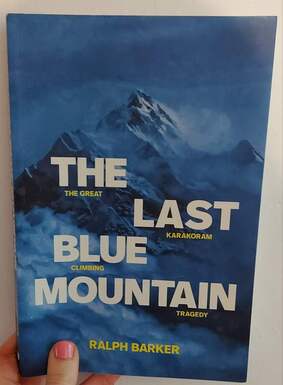 I read The Last Blue Mountain by Ralph Barker a few months ago now, and I still catch myself thinking about the ending. The tragedy of it has lingered in the back of my mind in a similar way to the death of Toni Kurz – so drawn out and with escape so, so close. The Last Blue Mountain recounts what must surely be one of the most tragic mountaineering disasters. It’s an absorbing and devastating account of an expedition to Mount Haramosh in 1957, when four experienced climbers made a bid for the first ascent of a largely unexplored mountain. Ralph Barker – the author – wasn’t on the expedition and, as the foreword explains, isn’t actually a climber himself. I was a bit concerned that his account would be inaccurate or emotionally detached: how much detail would it have been possible to pass onto someone who not only wasn’t on the expedition, but isn’t even a climber himself? But Barker’s account is still vivid and compelling, and his objectivity allows for an insightful and sympathetic portrayal of the climbers. One of the real strengths of this book is the care with which Barker explains each man’s weaknesses – always balanced against his strengths, always explained and justified. I loved Barker’s attempts to understand and reason through why these men are here, suffering and struggling just for the sake of exploring the mountains. The first three quarters of the book all lead up to the catastrophe. It can be difficult to hold the reader’s interest through what is inevitably a very repetitive part of the expedition: trudging up and down between the camps, investigating route options, managing food supplies. Barker shows plenty of small careful details to keep it interesting, and it is here that his capturing of the climbers’ thoughts and emotions after reading their diaries is really valuable. Maybe this is partly why the later tragedy is so devastating to read: Barker’s distanced perspective allows every climber in this book to be fully fleshed out, and seeing their excitement and enthusiasm at the start of the expedition adds to the devastation as the climb falls apart. I won’t expand on the details of the tragedy so as to avoid spoiling it for anyone unaware of what happens – but the bravery and selflessness of all four climbers is palpable. Barker vividly captures their determination and persistence, and the mental strength it must have taken to keep trying again and again. Often looking back at mountaineering disasters allows you to track the path of the tragedy, noting each tiny mistake that escalated until the disaster slowly becomes inevitable. There’s no sense of that here – just dedicated climbers who got incredibly unlucky, despite repeated heroic attempts to escape. Barker’s retelling is haunting and evocative, and is an excellent tribute to those who lost their lives on this expedition. (I was provided with a free copy by Vertebrate Publishing in exchange for an honest review.)
0 Comments
Leave a Reply. |
book REVIEWSPredominantly climbing/outdoors literature, mountaineering history and nature writing. Archives
July 2023
Categories
All
|
 RSS Feed
RSS Feed


